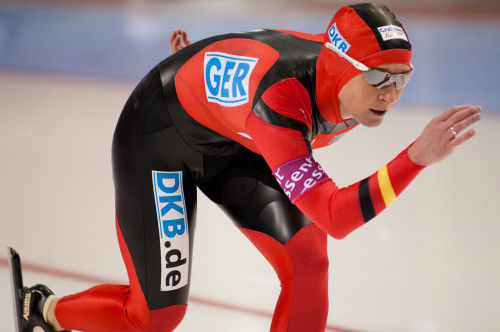Sochi Day 1: Mens 5000m
Recap
So that went mostly as expected. Sven got pretty much the exact time I said he would by skating pretty much the exact splits that I said he would. I’m pretty sure that’s going to be my most accurate prediction of this whole games (maybe I should quit while I’m ahead?). Also impressive was the performance of the other two dutch skaters who for about 3km looked like they might just knock Sven off the top spot, but alas Jan Blokhuijsen had to settle for the silver, and Jorrit Bergsma the bronze medal. I wonder how long it’s been since there was a dutch 1-2-3, especially impressive considering that the maximum number of entries per country in the 5k is three. Of note was a strong performance from Bart Swings to finish 4th place – not bad for someone who has only been ice skating for three years. Surprisingly low in the standings (still in the top 10, but I really thought they’d be in the medals) were the top two Norwegian, and Russian skaters, especially considering Yuskov had unofficially broken the 3k world record near the start of the season. Sven’s performance though a class act, putting a five second gap between him and second. The rest of the field generally within a second or two of the next place, there isn’t another gap of five seconds until right at the end of the result list. Just to put into perspective how close everyone was, Sven would have lapped the last two skaters, but if you take him out, everyone would have finished on the same lap, and that’s after skating 5k for six and a half minutes at about 47km/h
Coming Up…
Tomorrow will see the start of the ladies competition with the 3000m. This is also the first race in which the result is fairly wide-open. The favourite must be the Czech Republic’s Martina Sablikova, who has been dominant at this distance since she won the gold medal at the Vancouver games. However, credible threats come from Germany’s Stephanie Beckert and Claudia Pechstein (pictured), who are each at very different points in their skating careers. Beckert, who won the silver medal at the previous games at the age of 21, and Pechstein who missed the last games because of a doping ban but will be appearing in her sixth olympics at the age of 42. The dutch, of course, are always a force and the young Antoinette de Jong (which means “the young”) who is technically still a junior(!) and is currently skating both junior AND senior competitions, will definitely be one to watch (she also has the advantage of being in the last pair), as will Ireen Wüst, also from the Netherlands. My picks are Sablikova, followed by Wüst then Pechstein, and the winning time should be about 3:58.
The 3k, unlike the 5k can be raced in one of two ways – one can either approach it like a 5k in which one races relatively flat splits, or one can race it as a deceleration event. That means that you would start out quite fast, and slowly slow down. The idea being that the time that you gain at the start makes up for the speed that you will inevitably lose at the end. And there are, of course, an infinite number of variations between those extremes. Purely in terms of energy expenditure, it is most efficient i.e. you will spend the least amount of energy for any given fixed time, if you skate completely flat splits, because of the fact that wind resistance doesn’t increase linearly, but as a square of the velocity. However, a 3k at world class level is ordinarily completed in under four minutes, which means that a well-conditioned athlete may indeed have enough energy to pursue what you might call a “wasteful” race schedule if it can be made to result in a faster time.
Technique-wise, Ireen Wüst is not a bad example, and she has the higher top-speed out of everyone in the 3k field. When she gets tired though, the portion of the push near full extension is not well-managed and she loses some pressure. Sablikova, by contrast doesn’t have very powerful pushes, but relies on being lightweight and having a good power-to-weight ratio, and taking more steps, especially in the corners. She also steers a lot with her knees, rather than her hips or shoulders. (Most skaters steer with their whole bodies, often with a greater emphasis placed on shoulders). Beckert again is a different story being somewhat less technical and instead relying on her physical conditioning.
Don’t forget to click on the ‘sochi2014’ tag to read more articles about this olympic games.


Leave a comment